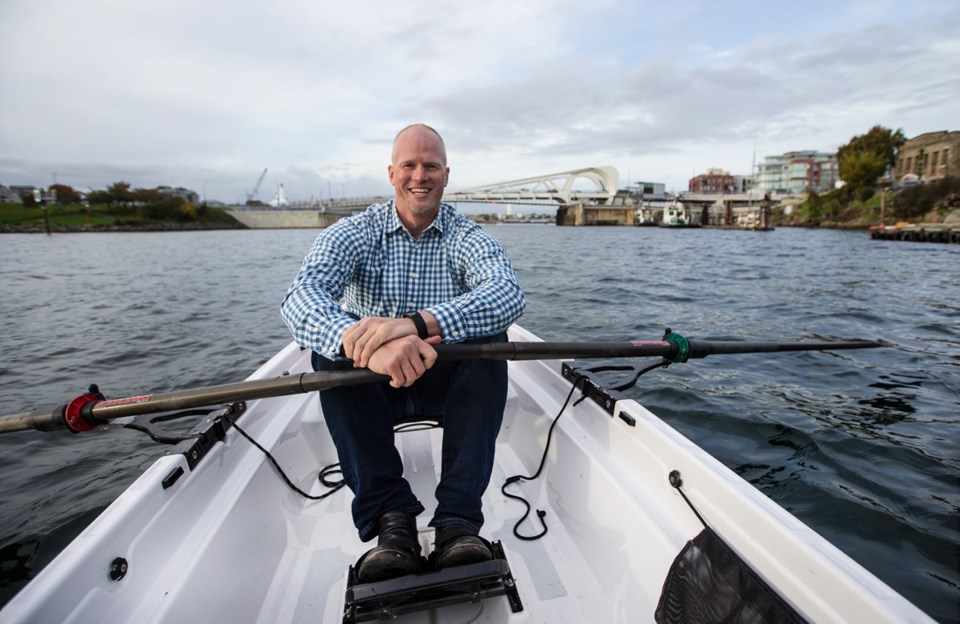Adam Kreek won an Olympic gold medal with the Elk Lake-based Canadian men’s eight crew at the 2008 Beijing Summer Games. His attempt to row across the Atlantic in a four-man boat, from Africa to Miami, ended in rescue by the U.S. Coast Guard.
Seven years after capsizing my boat in the Bermuda Triangle, I still speak regularly with my crewmates. “This coronavirus craziness … Do you feel energized?” my former captain, Jordan Hanssen, asks.
“Yeah,” I respond. “It’s a strong feeling. But the drive can get overwhelming.
“It’s an adventure — not one we choose, but we’re into the unknown. I’m all lit up!”
From my comfy little corner of Greater Victoria, the coronavirus doesn’t feel like a storm, let alone a capsize. Instead, it feels like a slow-moving fog where the currents and waves have turned against us.
Yet, for some, the waters are raging. Front-line nurses and health-care workers are exposed to the virus every day. Supply-chain professionals are working in overdrive. Executives and business leaders are struggling to manage cash flow and keep their staffs employed. Parents with young children and adults with low-functioning dependents are overwhelmed with added responsibilities.
Charities, low-income families and not-for-profit organizations are struggling the most. I sit on the board of directors of Ergo Eco Solutions and Cowichan Energy Alternative, two carbon-reducing organizations that recycle waste cooking oil from restaurants into locally sourced petroleum-replacement products. Our restaurant partners are struggling with low business volumes, which also means that our supply has dried up.
An adventure is more exciting when you can feel like you are on a boat together — rowing as one through the wind, waves and rain. That’s why I’m grateful that the Rapid Relief Fund was established to help keep the most vulnerable safe.
Caring for others in times of crisis has a remarkable impact. It turns fear into action. Helping others helps us get out of our own way, feel better and find more joy in our shared adventure.
Fear and adventure wrestle in my chest every day. Who wins? On average, adventure seems to come out on top, but not every day.
My children are in Grade 4, Grade 1 and preschool, and like so many others, my wife and I are struggling to become homeschool parents while also managing our small consulting business and pay the bills. Revenues have dried up, so we’re focusing on making our boat ship-shape while we ration the resources we have saved. We’re loading our metaphorical cannons so that we can be ready when the economy opens up again.
Fear creeps in when the weather is insipid, and all we can do is stay calm and carry on. The danger festers in our minds and feelings. In the dark side of my soul, I fantasize about being one of “those people” who are employed by governments, retired with regular pensions or have secure jobs with large corporations.
Sometimes, I feel like climbing between my mattress and box spring and letting the pressure soothe my anxious heart. Other days, I wish the disaster was bigger, more real and in my face — a monster I could yell at and fight with my fists.
Then, like a gull calmly soaring through a raging storm, hope returns. Without fear of loss, there is no adventure. We are the lucky ones! We can do something with our energized spirits. Regardless of how horrible you feel, thousands in our community would instantly trade places with your anxious heartbeat.
Adventure, when you are living it, can feel uncomfortable. At first, it’s uneasy and nauseating, and you yearn for normal to return. Yet, you adapt, tolerate and then find new ways to thrive. You begin to notice redeeming moments that shine like reflected snow off the Olympic Mountains through pollution-free air, the laughter of a family playing together in the backyard or twinkling songs of birds without the hum of motorcars in the background.
Finally, when it’s all over, what do you want to say you did in the face of this storm?
“I hovered fearfully in my den, addicted to the internet and cable news. I hoarded chocolate bars, cleaning supplies and toilet paper. I profiteered from others’ poor planning.”
Or: “I learned some new skills and gained a new perspective. I’m amazed how little I need to travel, consume or be entertained to be happy. I reconnected with my authentic self. I made bread, crafts and a garden. I beat pots and pans. I build my community.”
Providence is engaged when we harness the undefinable forces of the universe to create a better future with the combined virtues of hard work, action and faith. Can we embody faith in a better future? And use our energy for productive activity?
Yes, we can.
And the Rapid Relief Fund has provided us with one perfect opportunity to embrace a crew mindset in the face of a storm and say that in the face of adversity, we chose adventure over fear.
HOW TO DONATE
Tax receipts will be issued. If you are open to receiving your tax receipt by PDF, please include an email address with your donation.
• Online: RapidReliefFund.ca
• Phone: 250-381-5532
• Mail: Send cheques (made out to the Victoria Foundation) to RapidRelief Fund, Victoria Foundation, 200-703 Broughton St., Victoria, V8W 1E2
The Rapid Relief Fund was created by the Victoria Foundation, the Jawl Foundation, and the Times Colonist to help people in need as a result of the COVID-19 pandemic. CHEK Television, Coast Outdoor Advertising and Black Press are helping to boost awareness. Every dollar received from donations goes out as grants to the community.
Donations are being distributed through the Victoria Foundation: victoriafoundation.bc.ca/rapid-relief-fund-disbursements



